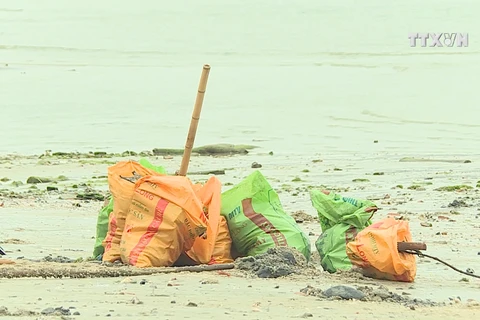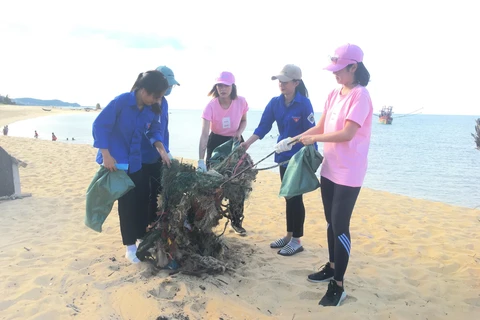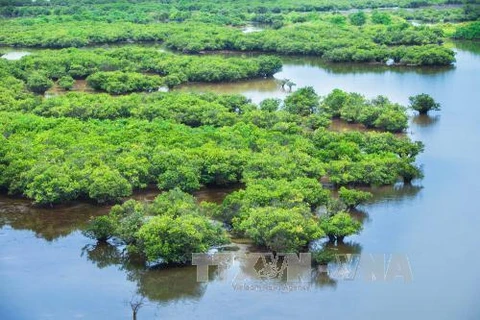 Kids join the first course on nature education at the forest school at Son Tra Nature Reserve in Da Nang. (Photo: VNA)
Kids join the first course on nature education at the forest school at Son Tra Nature Reserve in Da Nang. (Photo: VNA) Da Nang (VNS/VNA) - Central Vietnam's first forest school has been launched in Son Tra Nature Reserve to provide an outdoor education site for school students in the central city of Da Nang.
The head of the school, biologist Nguyen Thi Tinh, said the school was built on the boundary of the 78ha eco-tour site in the reserve. It will offer education on biodiversity, first-hand experiences with forest research and outdoor skills and a chance to explore the lifestyle of the area's endangered red-shanked douc langurs.
Tinh said it is the first such forest school in central Vietnam to offer valuable experiences and lessons for young students.
She said the educational programmes will include field trips in the jungle, observing the langurs and research on the area's flora and fauna starting in late August.
“We hope that school students will fall in love with the forest and wildlife as well as natural experiences," Tinh said. "The centre also plans to provide forest bathing for nature lovers and tourists in the future."
“We offer courses for groups of 26 school students for each trip. The programme targets building up young generations with love of nature and a responsibility for forest restoration and wildlife protection.”
The centre, in middle of the forest 11km from the city centre, will also host wildlife study, painting, environment clean-ups and tree planting activities.
Last year, the city’s education and training department, in cooperation with the Centre of Biodiversity Conservation and NGO GreenViet, introduced the Son Tra Nature Education Centre – an exhibition and museum centre focused on the fauna and flora of the nature reserve on Son Tra peninsula.
According to the city’s education and training department, more than 25,000 school students and 3,000 local residents have participated in nature awareness education activities and field trips in the jungle.
The reserve, which covers 4,400ha, is home to more than 1,300 red-shanked douc langurs and more than 1,000 plant and 370 animal species.
The reserve hosts at least 10,000 visitors per month.
Authorities in the central city of Da Nang have warned tourists not to feed local monkeys.
During the recent peak tourist season, a herd of wild monkeys have been frequently spotted to gather at the landfill behind Linh Ung Pagoda on Son Tra Peninsula, scavenging for food, even when environment workers are present to burn the trash.
For a long time, tourists have used candies and fruits and other types of food to lure these monkeys into a position where they can be photographed.
Nguyen Van Hung, a local street vendor, said the monkeys got used to being fed and began "asking" for food or aggressively stealing it from tourists, sometimes causing quite a scene on the road which might result in accidents.
“They continue giving food to monkeys despite my warnings,” he said.
Researchers say that by feeding the wild animals, tourists have changed their living habits. From searching for food in their natural habitat, some monkeys have switched to food meant for human, which is not really good for their digestive system.
Ecologist Ha Thang Long, founder of NGO Green Viet, said that in addition to the negative impact on the monkeys, direct contact between humans and wild animals increases the risk of diseases for both sides.
Duong Thi Xuan Lieu, head of the Tourism Management and Operation Department under the Management Board of Son Tra Peninsula and Da Nang beaches, said the board had put up signs discouraging people from feeding the animals and urged tour operators and transport providers to warn tourists against such practices.
However, due to poor management and the lack of a mechanism to punish those who feed the monkeys, the situation has not seen much improvement.
In 2015, two tourists were hospitalised after being attacked by monkeys on Son Tra peninsula.
Tourists are recommended to keep themselves safe and preserve the natural habitat for local wildlife by keeping their distance from wild animals.-VNS/VNA
VNA






















